Executive Summary
"Unburdened with the experience of the past, each generation of bankers believes it knows best, and each new generation produces some who have to learn the hard way." - Irvine Sprague, former chairman of the Federal Deposit Insurance Corporation and author of 'Bailout: An Insider's Account of Bank Failures and Rescues'!
First Bank of Nigeria's (FBN's) tale of advancing but troubled existence continues. From reported high-powered nocturnal meetings with Central Bank of Nigeria (CBN) officials to high-speed maneuverings to edge out recalcitrant board members allegedly unwilling to bend to the regulators dictates; the text and subtext of the recent decisions by the monetary authority to nudge out directors and board members of FBN and its Holding company, FBNH, follows a fine line between regulatory firmness and subtle institutional interests. The silence of those affected is equally an instructive footnote to the observations and findings espoused in this report.
In a confidential report written by Proshare in March 2020, FBNH was in active discussions with the CBN to facilitate a takeover of the three domestic money banks sharing the characteristics of low capital adequacy ratios (CARs) negative shareholder funds. The targeted banks were Polaris Bank, Heritage Bank, and Unity Bank, individually considered ripe for acquisition. The deal was to pick up the banks in one fell swoop, but this was not possible; to acquire Polaris Bank with Heritage Bank pleasantly added as a 'deal sweetener.' These deals fell through, and it is instructive to note that FBN currently serves as the clearing-house bank to the three market DMB's putting it in pole position to understanding their cash flows and non-contingent business liabilities.
Notably, in Proshare's sidebar discussions with senior officers of the Holdco at the time, the executives insisted that such talks were not on the table and would be premature, if not a fishing expenditure on our part. Nevertheless, with the increased speculation in the local media of a forthcoming merger or acquisition of weaker deposit-taking institutions in 2020, FBN was quick to release a public statement which noted that:
"Recent events in the industry have thrown up Merger and Acquisition opportunities for Banks. Therefore, it is not unexpected that Analysts will continue to share viewpoints about the evolution of potential consolidation in the Nigerian Banking Industry.
There will always be speculation on FirstBank's involvement on account of its size, liquidity, systemic importance, and historic support in backstopping the industry.
Inorganic growth remains a strategic consideration for all financial institutions, but from FirstBank's perspective, will only be considered when it is value accretive to shareholders and other key stakeholders.
Similar to other Nigerian Banks, FirstBank continues to scan Sub-Saharan Africa in general for potential acquisitions. FBN Holdings Plc is mindful of its responsibilities as a Premium Board listed company and will make appropriate disclosures should it find such value."
Of note, the statement did not deny the possibility of a merger or acquisition. The bank release merely suggested that the Holding company was not immediately interested in such a corporate move. That was inconsistent with what our intelligence gathering had submitted.
The response by the bank therefore did not tie-up with continuing backroom discussions. More recent interrogation of events validates the earlier speculations of a proposed merger of Polaris Bank, Heritage Bank, and FBN. Nevertheless, considering ongoing events at Heritage Bank, any merger consideration comes with complications (including the deal that acquired Keystone Bank).
While in Q1 2020, FBNH's acquisition of Heritage Bank may have been a top-drawer consideration, the new turn of events sees the outcome of any deal as less compelling. The emergence of a strong takeover bid by a foreign investor with ties to a middle east venture capital advisor, could have reframed the takeover discussions. The advisor, currently concluding arrangements for business transactions in the Oil & Gas sector, may have succeeded in convincing the CBN of its client's superior bid for Heritage Bank. The middle east option would mean less systemic risk and new foreign direct investment (FDI) inflow.
Yet, what remains a problem that has stalled the transaction's completion is Heritage Bank's chief executive officer (CEO) efforts to get the best possible buyout deal. The attempt by the CEO to negotiate an attractive handshake and retain a continued, but less prominent, presence at the bank has become a transaction dealbreaker.
According to those familiar with the matter, the Heritage Bank boss has held back his signature on agreed terms of acquisition as he reviews his response to the CBN, which recently required the bank to confirm the conclusion of its ongoing recapitalization arrangements. The catch-me-if-you-can intrigues between Heritage Bank, the CBN, and a series of prospective investors have made for gripping real-life drama over the last three years, but the game seems to be up (for all parties).
A few analysts have speculated that if Heritage Bank does not close a deal with the present investor, it would likely fall into the arms of FBN Holdings regardless of the financial institution's many denials of any prevailing interest. The FBN Holding outcome may be less attractive to Heritage Bank's present board of directors considering the balance of negotiable exits. Besides, FBNH acquiring Heritage Bank shows little upside for the acquirer (see illustration 1 below).
Illustration 1 The Potential Outcomes of An FBNH Acquisition of Heritage/Polaris Banks
In the aforementioned confidential Report, Proshare analysts noted that:
"It has been known for over a year that FBN served as the domestic clearing bank for Heritage Bank, with the management of Heritage paying billions in clearing account expenses to First Bank to date. However, we understand that Heritage Bank routinely stretches beyond its agreed clearing account balance, meaning that FBN could be a creditor (not precisely a loan agreement ab initio) to Heritage Bank to the tune of about N250bn (unreconciled). Even as a business with a large credit balance against Heritage Bank (without a CBN letter protecting it from potential future liabilities), FBN would be taking a considerable risk to enter an acquisition or merger with a bank with a negative shareholder's fund of over N286.58bn year-to-date (YTD) as of September 2019.
The other challenge would be Heritage Bank's loss before tax of N21.45b in Q3 2019 (or its loss of N3.53bn in September 2019), not to talk of carrying the near N1trn Asset Management Company of Nigeria (AMCON) burden of Polaris Bank".
Beyond Heritage, An Aerial view of Polaris Bank
FBN had stated as far back as four years ago that it would favor an inorganic strategic growth plan like Access Bank. The bank had viewed a carefully conceived set of acquisitions as the best way to expand and improve market share at a lower incremental cost of operations. The plan is not entirely wrong; if the bank identifies suitable targets, the inorganic growth strategy sits well with emerging global developments across financial markets. However, suitable is the operative word.
A bank like Polaris Bank, for example, would be a good acquisition in the general scheme of things. However, concerns about the bank's lean shareholder's fund and its large Asset Management Company of Nigeria (AMCON) exposure placed at slightly under N1trn in Q4 2020 would cause intended acquirers to pause. The Central Bank would have to prevail on AMCON to write off the outstanding Polaris Bank liability to make the acquisition worthwhile. Alternatively, the CBN would need to activate a process of rubbing out the debt from the bank's books. The forbearance would be in addition to a letter to any acquiring entity that such institution would not be vicariously liable for present and future legal actions that result from the activities of Polaris Bank (or any other bank) that took place before its acquisition. In FBN, the CBN would need to provide an official letter of non-liability for the clearing balances outstanding to the acquired bank (and similar institutions such as Heritage Bank) before the transaction would align with shareholder's broader interests.
The knotty problem of clearing liabilities of the banks that clear through FBN would require deft regulatory arrangements to reduce the size of forbearance of any post-merger entity. In the wake of recent events at FBN and FBNH, the inorganic growth path must be trod carefully. One of the causes of Heritage Bank's shaky finances was its brave but ill-advised acquisition of Enterprise Bank, an AMCON legacy institution pockmarked with undisclosed toxic assets and off-balance sheet booby traps. The Heritage template needs a rewrite.
FBNH's and FBN's inorganic growth plans could work and improve operating performance but require skill and careful guidance. According to a bank insider, "FBN needs to take bold steps to restore its leading position in the domestic banking industry, but there is a wide gulf between being bold and being reckless," this is true but harsh. An FBNH bid for Polaris Bank will make strategic sense if a top-to-bottom technical review of Polaris Bank's loans and advances shows loan quality within reasonable recovery limits (in other words, low delinquency). Furthermore, if the acquired bank's contingent liabilities can be negotiated to avoid the pain of the acquirer, then Polaris Bank would seem to be the best acquisition option of the three Nigerian banks (Heritage Bank, Unity Bank, and Polaris Bank) identified as showing weak to modest shareholder funds and profitability (see charts 1 & 2 below).
Chart 1: Selected Banks with Low and Negative Shareholder's Funds Jan. 2020
Source: Proshare Regulatory Findings January 2020
Chart 2: Selected Banks Profit/(Loss) (N'bn) for January 2020
Source: Proshare Regulatory Findings January 2020
Winning the Merger End Game
Mergers can be a complex brew, even with two good parties. Post-merger integration could be as easy as balancing a tray of eggs while fleeing from a burning building. The problem of corporate mergers is the nasty details of numbers, culture, vision, and management. When GT Bank bought the former Magnum Trust Bank, the board of GT Bank (now GTCO on adopting a Holdco structure in 2021) sold Magnum within a year of its acquisition.
In a 2015 private conversation on a project concerning the lives and times of corporate giants in Nigeria, Fola Adeola, the first managing director of GT Bank, was asked why GT sold Magnum Trust Bank quickly. Adeola noted that amongst the challenges faced by the acquirer was the sharp difference in banking culture, "we saw no way that the two cultures could find harmony. Hitching a horse and a bull to pull a carriage is not a bright idea," he noted.
According to Adeola, "the merger play must always be strategic and not based on a whim. Success requires institutions with compatible corporate DNAs to build what Arie de Geus called 'the living company'; otherwise, the new entity will suffer terminal challenges. The DNAs of merging companies do not have to be the same, but they must be sufficiently compatible to make the union work," he insisted.
Only a few banks in Nigeria have managed the DNA challenge successfully: Access Bank on merging with the former Intercontinental Bank (2012) and Diamond Bank (2019), and STB on combining with the old UBA (2005).
Almost half (47%) of merger success stories are about identifying the right merger partner. No matter how good a partner appears from afar, corporate marriages need compelling financial and strategic facts to thrive; as some analysts have noted, love is good but requires deep anchors. The fact that two companies admire themselves does not guarantee their successful union; businesses must show the correct numbers and cultures, not just the right emotions. Wrong numbers and incompatible cultures are instant deal-breakers for merger successes (see illustration 2 below).
Illustration 2: Weighing the M&A End Game
Where the Future Matters
FBNH/FBN needs to resolve internal differences quickly and concentrate on operational excellence. Analysts note that the strain between the bank and Holdco must give way to more productive corporate action to drag the banking giant to new financial heights. It has become evident that past demons must be exorcised as the board and management frame the banking franchise's revised narrative.
The Adetuntan-led bank management has a short time to make a significant impact. The management cannot fulfill a turnaround mandate if stuck in unnecessary board room squabbles. Given the need to avoid distractions, the bank's management would also be unsuccessful if it simply continues to do old things slightly better. Analysts note that Edison's electric light did not come about from the continuous improvement of the candle.
What FBNH and FBN need is a radical makeover. If FBN, and by extension FBNH, is to do well, then the bank must consider the following:
- A new realignment of corporate culture around milestones; for example, a CIR of 50% would require a cut in paper, pens, logistics, and other administrative expenses. In addition, a reduction in the cost of risk (CoR) would throw a boon to a new shared culture of declining non-performing loans (NPLs).
- Loan concentration (excessive loans made to a sector or industry) must change as diversification of loan assets becomes as important as the ongoing winding down of insider-related credit (toxic insider loans were about 5% of the bank's total loan size as of H1 2021). The bank needs to keep its loan portfolio reasonably diversified within the leading economic growth sectors, including Oil & Gas and Energy; however, funding structures and collaterals would need revision. The bank may need to make more sale and leaseback arrangements and attempt asset securitization transactions to reduce loan risk.
- Technology competitiveness is acceptable, but the bank needs to be ahead of the technology curve. So, technology leadership should be its primary concern, especially as the management lays the foundation for a 25-year legacy. The bank may collaborate with tech partners, but it must also build solid in-house technology capabilities. Product and service development research must be an integral part of the business process. Simple improvements on basic service are necessary but insufficient. Financial lenders must infuse technology to ensure blue ocean progress (dominating uncontested or weakly contested market spaces).
People, Processes, and Technology - Upgrading the Future
FBNH and FBN will have to improve the quality of staff through strategic planning and scenario analysis. With the delta-variant of COVID-19 raging across continents and confirmation that the variant has found its way into Nigeria, the financial lender will have to retool workers for an age of remote banking transactions. The new era would mean reviewing the staff needed and their skills to keep the bank as efficient and effective as their tier 1 counterparts. Riding on the back of a changing business environment, the bank would need to revise lending and monitoring processes. The lender would need to adopt procedures that roll up human-to-human contact and accelerate digital interventions (see illustration 3 below).
Illustration 3: FBNH/FBN Rethinking the Future
The digital transaction age would mean that offices would be paperless, data storage would be cloud-based, and credit evaluation, approval, and monitoring would involve more significant data processing. The bank would have to drive more intense artificial intelligence (AI) and machine learning (ML) programs that are predictive rather than reactive. Data analytics would have to emerge as a vital tool of customer service excellence (see illustration 4 below).
Illustration 4: Six Principles of Leveraging Digital and Analytics
Proshare recently surveyed public perception of the bank, with the following insights:
- The bank was not seen as a major technology-driven financial service provider (this perception may have been inaccurate given that the bank's firstmobile initiative was designed to improve rural financial penetration and fill the 'white spaces' in rural and urban SME banking service). However, its agency banking service has received praise.
- The mid-2000s saw the reputation and corporate performance of the bank deteriorate as management after management struggled with a series of self-inflicted challenges ranging from large insider-related loans, limited risk asset diversification, weak internal controls, and wrong-sized personnel and skills.
- FBHN, as a later day parent institution of FBN, suffered from unneeded intrusion from significant individual equity holders with shares of between 8% and 10% in the Holdco.
- The narrow interest of these individuals caused a governance crisis which impaired the confidence of the sector regulators (CBN and NDIC), Credit Rating Agencies, stock traders, analysts, and retail investors.
- The recent removal of some of the significant shareholders from the board of FBNH is yet to remedy the reputational damage the financial Holdco still suffers.
- The Holdco has received a poor credit rating, although more recent ratings by Moody's Credit Rating put a better twist to the Holdco's financial performance in H1 2021.
- Stock traders believed that FBNH and FBN must come clean about the nature and size of the CBN forbearance to give a clearer picture of the quality of the bank's assets.
- Analysts shared the opinion of traders. A lack of clarity over the nature and size of CBN's forbearance has created asymmetric information. The implication is that some people have superior knowledge of the bank's actual financial position, thereby creating price inefficiency and arbitrage gaps. Analysts and market traders are unclear about the bank's proper valuation.
- The public is cautious about FBN and FBNH. The CBN's recent statements concerning forbearance and delinquent insider-related credit have made the bank a cautionary tale.
Corporations should never allow the lessons of a good crisis to go unattended. The strategy of hope is a loser's game because hope has never been a decent method. In times of unique difficulties, great opportunities emerge, FBNH would do well to seize the moment. The Report underscores this point after appraising the bank's recent financial books and assessing its corporate governance. The Report tiptoes around the shaky pack of cards that make up its previous operating performances and the growth-restraining internal tensions and delivers its review in seven (7) sections.
Section 1 of the Report looked at all Tier 1 banks (nicknamed "FUGAZE") listed on the Nigeria Exchange (NGX) and tried to position FBNH within the league of competing peers. The analysis of FUGAZE created the context in which FBNH's H1 2021 financial result was assessed. The outcome was an improvement over the relatively poor results between 2016 and 2020. For example, as recently as 2018, the financial holding company had a nonperforming loan ratio (NPLR) of 26%, the worst in its banking class at the time. The more recent (H1 2021) ratio of 7.2% represents an improvement. The average NPLR for Tier 1 banks in Q1 2021 was 5.44% as against 4.42% of all banks listed on the NGX. The most obvious implication is that several second-tier banks achieved NPLRs lower than the average for tier 1 rivals.
The Report adopted a discounted cash flow (DCF) method to set a valuation on the deposit money institution to establish whether the stock market places a premium or discount on the lender. In addition, the section made a few financial projections to provide context for management's possible future strategy.
Section 2 provides historical context to the lender's choppy performance and management's 'mood swings,' which have prevented sustainable growth in the last two and a half decades. The banks over 100 years of existence count for little in a world where the swift and focused easily outperform the big and sluggish. With 127 years under its belt, FBN has punched chiefly below its weight, leaving newcomers like Access Bank, Zenith Bank, UBA, and GTCO to take charge.
Section 3 looked at the Central Bank's decision to remove non-executive directors of the Holdco and the bank to restore confidence in the lender's overall management and governance.
Section 4 is an excursion into FBNH's financial numbers to understand where the lender appears to have operating challenges and opportunities.
Drawing from the financial figures in the previous section, Section 5 looks at the imperatives for action and circumscribes the policy thrusts needed for corporate stability and legacy setting. The Report dives into Q1 and H1 2021 quarterly and half-year results to see if they sit within the lender's strategic intentions such as Impairments, NIM, NPLs, CIR, CoR, ROE, ROA, Valuation. The section uses the comparative financials of the bank to think through the strategic threats and opportunities that may emerge shortly. From Michael Porter's five competitive forces, the section sees how W. Chan Kim and Renee Mauborgne's blue ocean shift could reshape FBNH/FBN's competitive future.
Section 6 of the Report looks at the strategic journey to healthier profits, dividend payouts, and executive stability. This Report section worked on the premise that the existing directors of the Holdco and the bank are in legacy mode, meaning they remain entirely focused on handing over a stable, profitable, and sustainable bank to the next generation of managers. The new would-be managers of FBNH/FBN will disrupt the financial market as they reimagine the future wholesale and retail service delivery landscape. These new corporate leaders would both meet customers' expectations and exceed them.
The final section of the Report, Section 7, breaks into an audacious attempt at FBNH valuation to see if the market has discounted the financial institutions underlying value. The section cautiously approaches the dangerous valuation road as the analysts used multiple methods and scenarios to explain current and future share prices.
 Lagos, NG • GMT +1
Lagos, NG • GMT +1











 432 views
432 views







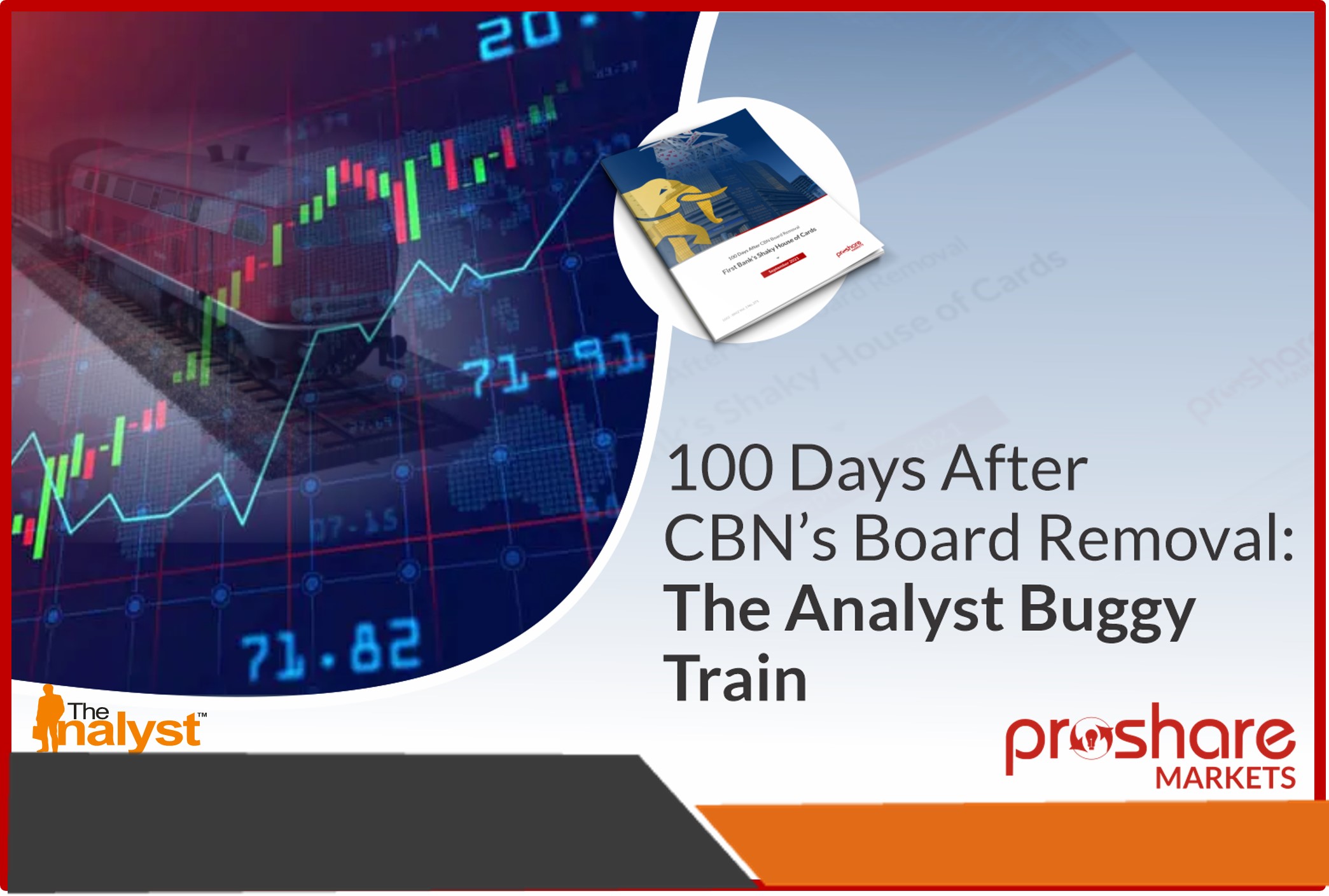
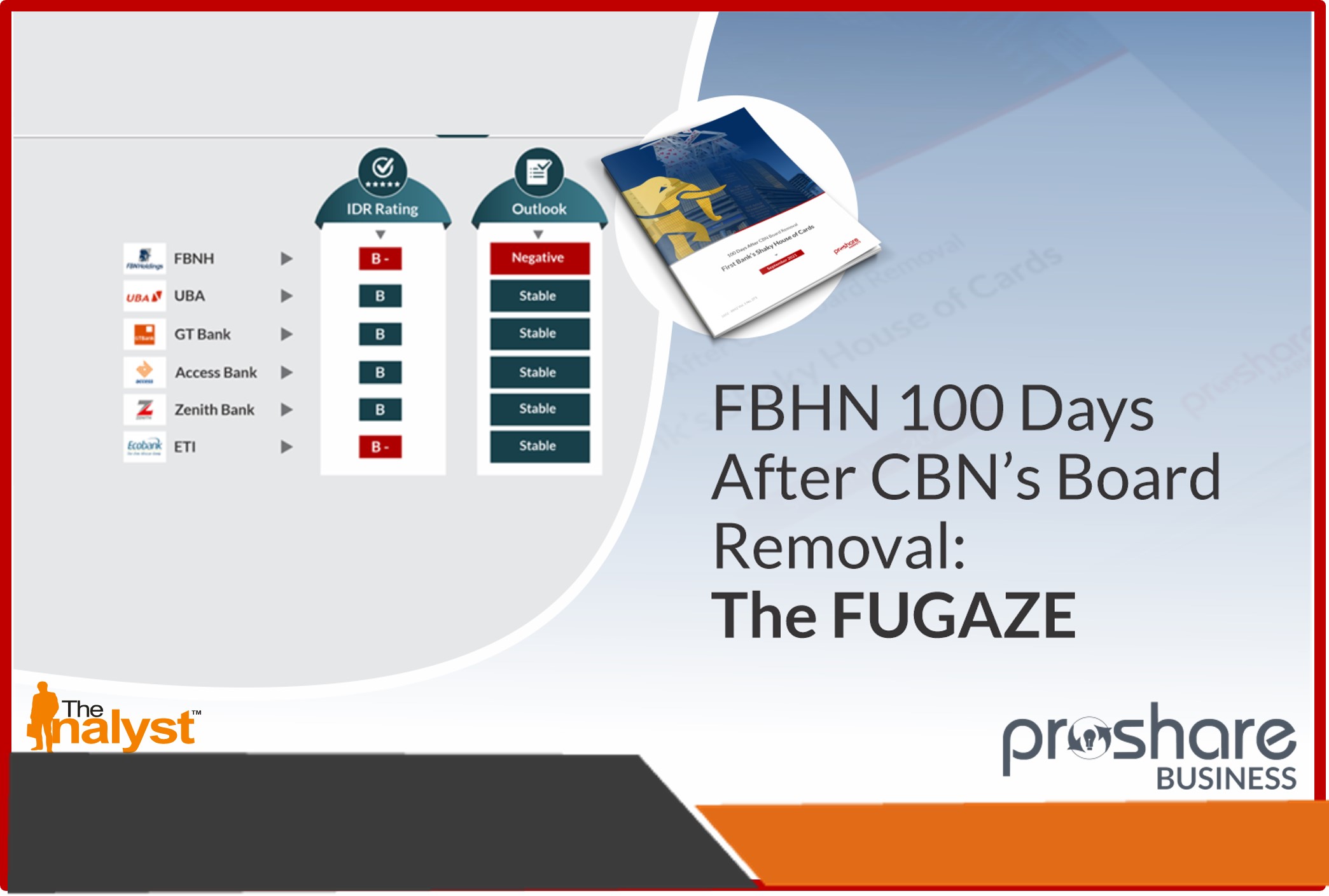



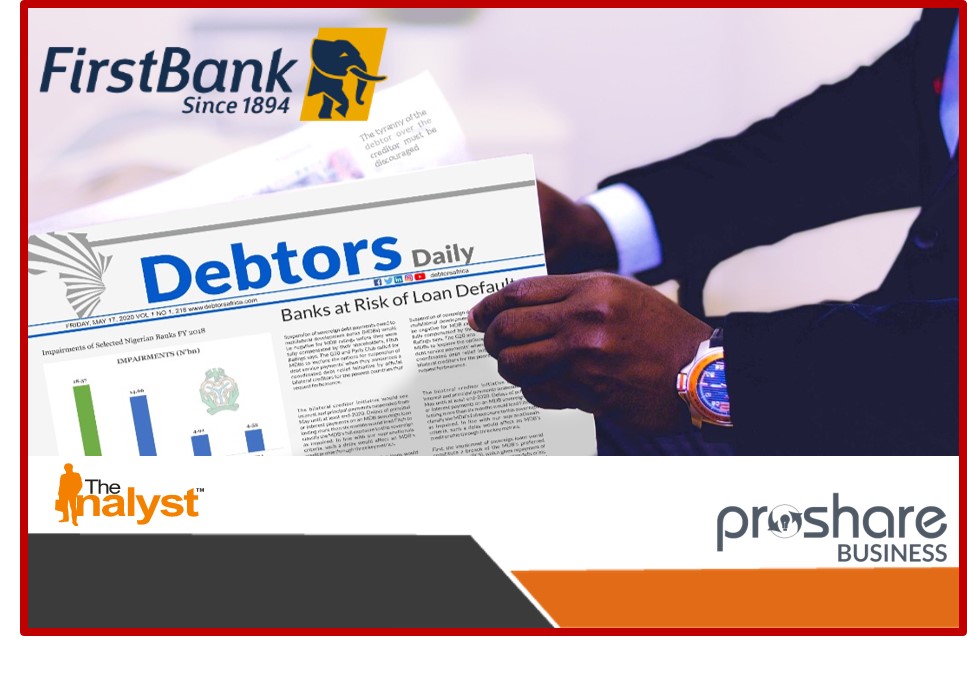
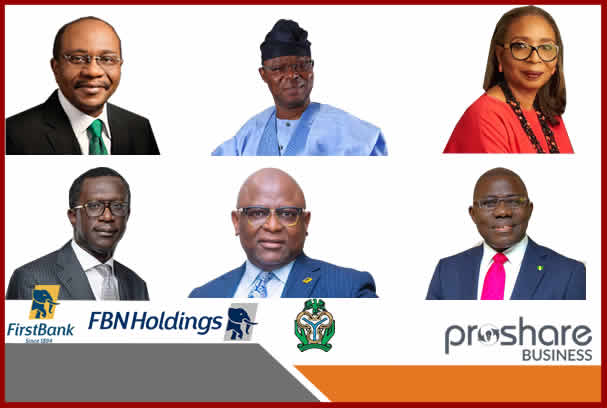
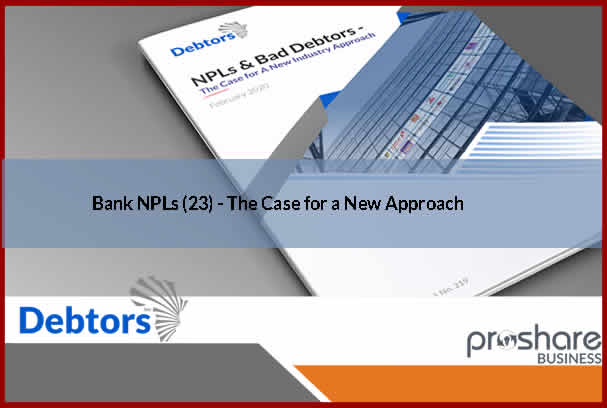






 Sponsored Ad
Sponsored Ad
 Advertise with Us
Advertise with Us









